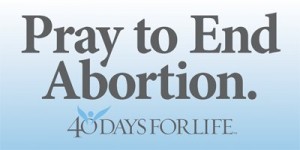God in Moscow
 As a special time of prayer and fasting, 40 Days for Life “is the answer to a great problem in our country.”
As a special time of prayer and fasting, 40 Days for Life “is the answer to a great problem in our country.”
Those words could be said about each of the 19 countries where 40 Days for Life vigils have taken place. But it’s particularly humbling to know that these thoughts are coming from Russia.
The speaker is Arevik Aivazova, the local campaign coordinator in Moscow.
Today’s entire report is an update on Russia’s first-ever 40 Days for Life campaign.
—————————————————–
MOSCOW, RUSSIA
—————————————————–

“Russia was the first country to legalize abortion, in 1920,” Arevik explained. “As a result, abortion still remains the primary method of family planning amongst most Russian women.” At 143 million, Russia’s population is less than half that of the United States. But the number of abortions is astounding.
“Officially, more than one million abortions take place in Russia annually,” Arevik said, “but this number excludes abortions in private clinics and medical abortions. Unofficially, the number of abortions in our country is more than six million a year. Now is the time to repent for the sins of past generations and stop abortion in Russia!”
Even though this is only Russia’s first 40 Days for Life effort, she said, “God’s work is so clearly seen in people’s lives.”

In addition to the vigil in Moscow, prayer is also taking place in two suburbs – Shchelkovo and Lyubertsy – as well as the St. Petersburg-area city of Vyborg.
“Our group prayed at abortion clinics,” said Elena Menchikova of Source of Life Church in Vyborg. “It was an unforgettable experience meeting with the women at the door step of abortion centers. God gave us words of prayer, which would not have happened if we had just prayed at the church and did not come in contact with these women.”
The church was asked to pray for a young woman whose mother wanted to force her to have an abortion. Some church members visited the family and showed them a model of a 12-week baby. “Both mother and daughter broke into tears,” she said, “and the unborn baby was saved.”

The campaign’s community outreach even opened the doors to prison ministry (shown above).
“We showed women in the prison a film, ‘Life from the Beginning to Birth.’ The film touched these women,” Arevik said, “and the officers saw the need to serve the women with post-abortion syndrome.”
Young and old alike are joining the effort. There’s a group of 350 bible school students who pray every morning for an end to abortion. There’s also a ministry called Elder Generation that is joining in prayer.
“Many of the elderly people cried,” said Tatiana Derr, one of the ministry’s leaders. “But God will not forsake those who have conceived … the babies will be safe. We’re praying for our grandchildren and for their future.”

We’ve talked about campaigns in cold-weather cities – and Moscow is certainly one of the coldest. “Given our climate, prayer on the street was the biggest challenge for us,” Arevik said. “The second half of February is traditionally the coldest time of the year.” It is not uncommon for the temperature to remain below freezing, day and night, for the entire month. Early March isn’t much warmer.
The vigil participants in Moscow are already looking forward to another opportunity to pray. This time, many were uncertain about attracting attention. “Considering the Russian mentality, people are just not used to seeing people pray on the streets.” But in the future, she said, “we will be bolder.”

